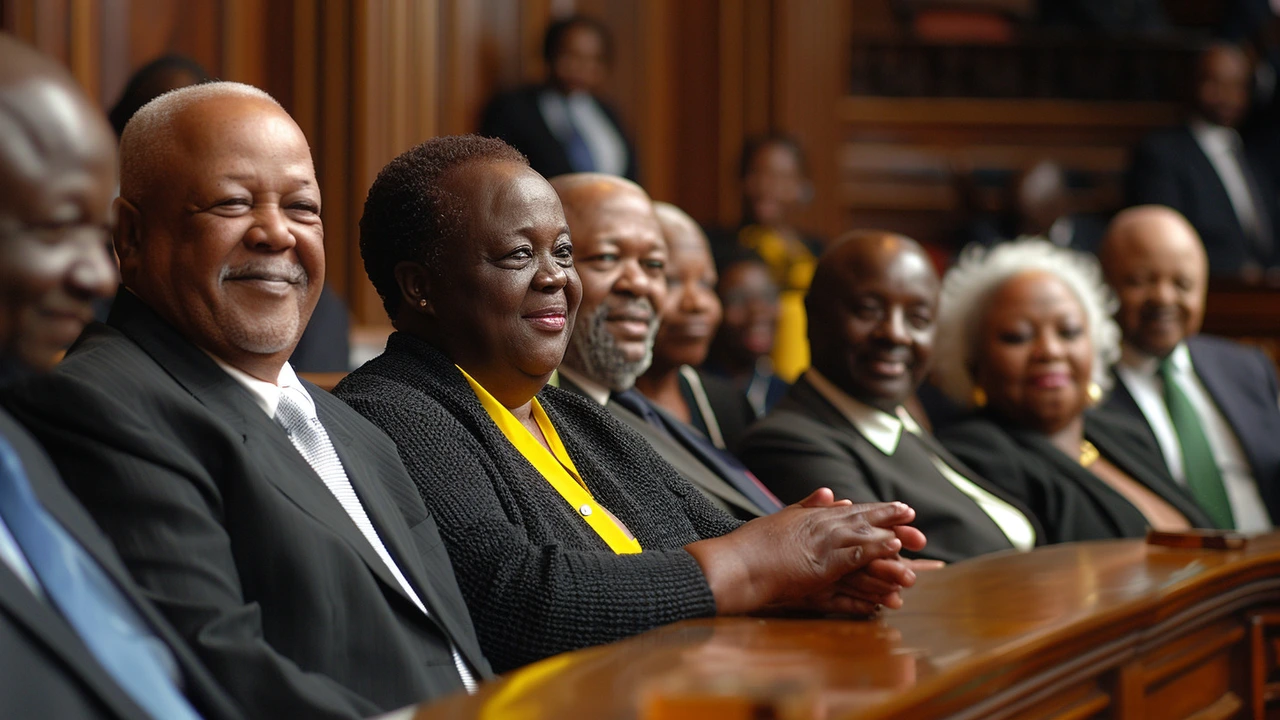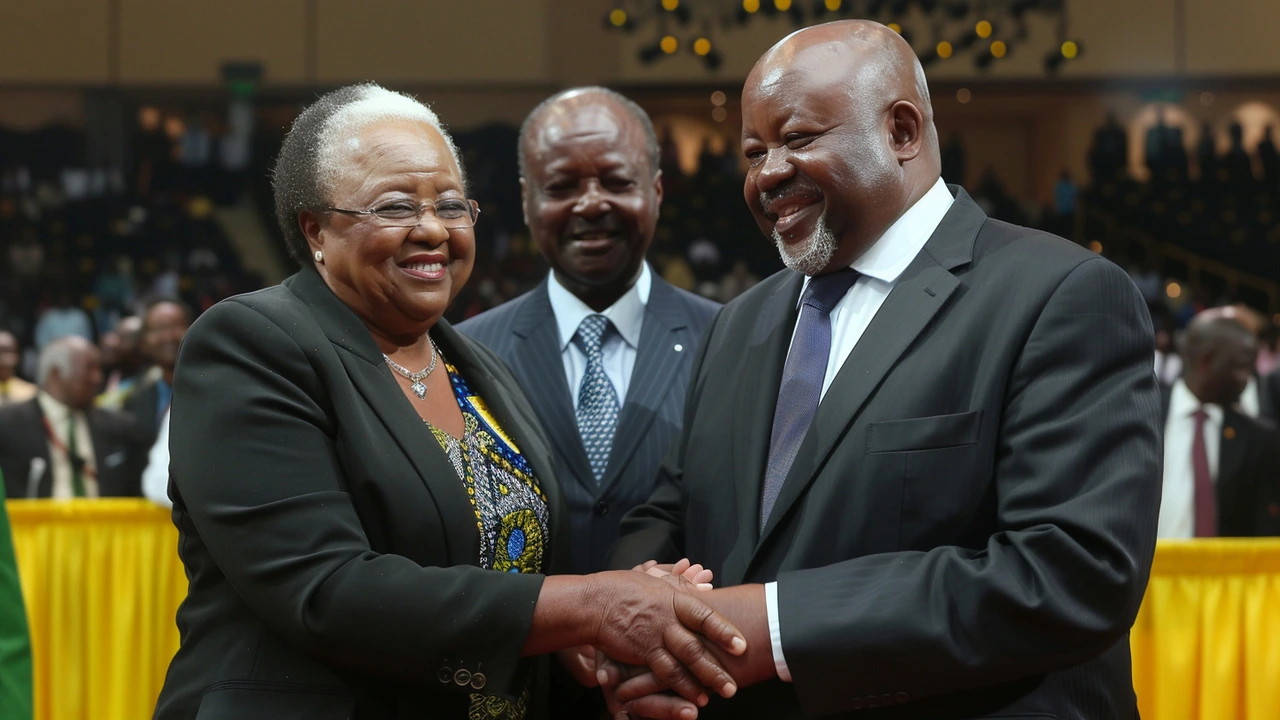15 Jun 2024
- 18 Comments
Introduction: A Landmark Political Shift
In a move that has sent ripples through the political landscape of South Africa, the Democratic Alliance (DA) and the African National Congress (ANC) have inked a power-sharing agreement to govern the Johannesburg and Tshwane municipalities. This agreement marks a remarkable shift as the DA, traditionally the main opposition party, will now share governing responsibilities with the ruling ANC. This development comes in the wake of the 2021 local elections, which ended in a stalemate with no single party securing a majority. The partnership aims to provide stable governance and tackle local issues such as service delivery and infrastructure development.
The Context of the Agreement
The power-sharing deal between the DA and the ANC was born out of necessity following the 2021 municipal elections. Neither party was able to secure a clear majority in the cities of Johannesburg and Tshwane, leading to a situation that required unprecedented cooperation. Multiple rounds of negotiations ensued, highlighting the complexities of coalition politics and the urgency to ensure a functional local government. The stakes were high as both municipalities are key economic hubs, with Johannesburg being the largest city and Tshwane hosting the administrative capital of South Africa.
Details of the Power-Sharing Deal
Under the agreement, the DA will hold the important positions of mayor in both Johannesburg and Tshwane, signaling a significant shift in the party's role from opposition to governance. The ANC, on the other hand, will be accorded substantial representation on the city councils, ensuring that they remain influential. This arrangement aims to balance power and ensure that both parties have a stake in the effective running of the municipalities. By sharing responsibilities, the DA and ANC hope to foster a more collaborative and less adversarial political environment.

Objectives and Expectations
One of the primary objectives of this power-sharing agreement is to stabilize local governance. Johannesburg and Tshwane have both struggled with issues related to service delivery, financial management, and infrastructure development. The DA and ANC have pledged to work collaboratively to address these challenges and meet the needs of residents. Key areas of focus include improving water and electricity supply, enhancing public transportation, and ensuring better waste management. The power-sharing arrangement is also expected to bring greater accountability and transparency to municipal governance.
Quotes from Party Leaders
John Steenhuisen, the DA's federal leader, emphasized the party's commitment to addressing the needs of citizens through this partnership. He stated, "This agreement is a pragmatic move to ensure that we can deliver on our promises to the people of Johannesburg and Tshwane. We are committed to working together to create a better future for all residents." Meanwhile, Dasa Ngobese, the ANC's regional leader, expressed confidence in the ability of both parties to work collaboratively. "This is an unprecedented step in South African local governance, and we believe that by putting our differences aside, we can bring about significant positive change," Ngobese said.
The Significance of the Agreement
This power-sharing agreement is significant for several reasons. Firstly, it represents a departure from the traditional adversarial politics that have characterized South African governance since the end of apartheid. Secondly, it underscores the importance of pragmatism and cooperation in addressing complex local issues. Finally, it sets a precedent for future coalitions and collaborations, potentially reshaping the political landscape of the country. As South Africa continues to navigate its democratic journey, such innovative approaches to governance could prove crucial in ensuring stability and progress.
Looking Ahead: Challenges and Opportunities
Despite the optimism surrounding the power-sharing deal, there are several challenges that the DA and ANC will need to address. Navigating the complexities of coalition politics, managing differing priorities, and maintaining a united front will be crucial. Additionally, both parties will need to work hard to earn the trust of residents who may be skeptical of this unprecedented arrangement. On the flip side, the agreement presents numerous opportunities. By pooling their resources and expertise, the DA and ANC can implement more effective and sustainable solutions to the problems facing Johannesburg and Tshwane. Furthermore, this collaborative approach could serve as a model for other municipalities grappling with similar challenges.

Conclusion
The power-sharing agreement between the DA and ANC marks a watershed moment in South African local governance. It is a testament to the possibilities that arise when political adversaries choose to work together for the greater good. As Johannesburg and Tshwane embark on this new chapter, the eyes of the nation will be watching closely. The success or failure of this experiment in collaboration will undoubtedly have far-reaching implications for the future of South African politics.
Relevance in Broader Context
This agreement between the DA and ANC also reflects broader trends in global politics where coalition governments are becoming more common, especially in democracies with fragmented political landscapes. The challenges and opportunities faced by Johannesburg and Tshwane are not unique and offer valuable lessons for municipalities and governments worldwide. The emphasis on collaboration over competition could pave the way for more resilient and adaptive governance structures capable of responding effectively to the needs of the people.


Roland Baber
June 15, 2024Seeing the DA and ANC put aside their historic rivalry reminds me that politics, at its core, is about serving people, not scoring points. The agreement could become a template for other cities struggling with fragmented councils. If both parties stay true to their promises, we might finally see consistent water and electricity delivery. It's crucial that the mayoral responsibilities are exercised with transparency and accountability. Citizens should keep a watchful eye, but also give the coalition a chance to prove its merit. Ultimately, collaboration can turn strained municipal services into a source of civic pride.
Phil Wilson
June 19, 2024The power-sharing framework operates under a quasi-cooperative governance model, effectively redistributing executive authority across party lines. By integrating cross-party council committees, the arrangement leverages interstitial policy dialectics to mitigate service delivery bottlenecks. Moreover, the fiscal consolidation mechanisms introduced aim to harmonize budgetary allocations, thereby reducing redundant expenditures. From a systems engineering perspective, these synergistic protocols could enhance operational resilience. Nonetheless, continuous performance metrics must be instituted to validate efficacy.
Roy Shackelford
June 23, 2024History tells us that the very elite have orchestrated these so-called "collaborations" to keep the masses in perpetual flux. Behind the veneer of cooperation lies a hidden agenda to dilute the core values that once defined each movement. The real power brokers thrive on perpetual ambiguity, ensuring that no single entity ever truly governs. In this labyrinth of political theater, the ordinary citizen becomes a pawn in a grander scheme. It's a reminder that vigilance is the only shield against subtle manipulation.
Karthik Nadig
June 26, 2024Wow, talk about a political plot twist! 🚀 The ANC and DA shaking hands feels like watching two rival houses finally share a roof. 🌍 This could either be the dawn of a new era or a fireworks show that ends in smoke. 😱 I’m holding my breath for the service improvements, but also for the drama that’s sure to follow. 😂 Let’s hope the coalition doesn’t implode before the next water outage.
Charlotte Hewitt
June 30, 2024Honestly, it smells like the usual back‑room deal where the big players set the board and the rest of us just get the crumbs. They’ll probably say it’s for the people while quietly reshuffling power behind closed doors. Nothing new, just another chapter in the saga of political puppeteering.
Jane Vasquez
July 4, 2024Oh great, because nothing says "effective governance" like two parties that have been at each other's throats for decades finally deciding to hold hands. I'm sure the residents will be thrilled to watch bureaucratic gridlock become a perfectly choreographed tango.
Hartwell Moshier
July 8, 2024Looks like they finally got around to working together its about time they stop fighting and start fixing things
Jay Bould
July 11, 2024Seeing such a partnership is a reminder that even in a diverse nation, we can find common ground. It’s heartening to think that different perspectives can blend to serve the city’s needs. Let’s hope the cooperation brings real improvements for all residents.
Mike Malone
July 15, 2024The recent power‑sharing accord between the Democratic Alliance and the African National Congress represents a seminal moment in municipal governance within South Africa's two most pivotal metropolitan areas. By allocating mayoral authority to the DA while granting substantial council representation to the ANC, the agreement endeavors to balance political influence with functional administration. This structural compromise is predicated upon the premise that shared responsibility can mitigate the endemic challenges of service delivery that have plagued both Johannesburg and Tshwane for years. In theory, such a collaborative framework should enhance policy coherence, reduce bureaucratic redundancy, and accelerate infrastructural projects that have long been stalled. Moreover, the coalition could foster a culture of accountability, as each party’s performance becomes mutually dependent. The integration of cross‑party committees is expected to facilitate more comprehensive deliberations, particularly on critical issues such as water scarcity, electricity reliability, and public transportation efficacy. From a fiscal standpoint, the joint budgeting process may allow for more prudent allocation of resources, potentially curbing wasteful expenditures that have historically eroded public trust. However, the success of this arrangement will hinge upon the parties’ willingness to subordinate partisan ambitions to the overarching public interest. The political calculus involved demands a delicate equilibrium, wherein ideological differences are negotiated without impeding operational momentum. Historical precedents in other coalition governments suggest that sustained dialogue and clear conflict‑resolution mechanisms are indispensable. It is also essential that transparent performance indicators be established, providing citizens with measurable benchmarks of progress. Should these safeguards be effectively implemented, the partnership could serve as a replicable model for other municipalities facing fragmented electoral outcomes. Conversely, failure to achieve tangible improvements may reinforce cynicism toward coalition politics and entrench voter disillusionment. Ultimately, the durability and effectiveness of this venture will be the litmus test for South Africa’s capacity to innovate within its democratic framework. Stakeholders across civil society are encouraged to monitor the implementation and hold officials to their commitments.
Pierce Smith
July 19, 2024The coalition’s primary goal is to deliver tangible services to residents, and that objective should transcend partisan rivalry. While the DA brings a track record of administrative efficiency, the ANC offers deep grassroots connections that can inform policy decisions. By combining these strengths, the partnership has the potential to address long‑standing infrastructure deficits. It is crucial, however, that both sides maintain open channels of communication to avoid stalemates. Transparency and regular public reporting will be key to building trust among the electorate.
Abhishek Singh
July 23, 2024What a joke.
hg gay
July 26, 2024It’s truly uplifting to see historic adversaries come together for the greater good 😊. The hope is that this collaboration translates into better water supply, consistent electricity, and smoother public transport for everyone 🚍. While skepticism is natural, genuine progress can only happen if both parties stay committed and keep the people’s needs front and center 🛠️. I believe that with patience and collective effort, the lingering service delivery challenges can be overcome 🌟. Let’s stay supportive, keep the dialogue open, and celebrate any small victories along the way 🙌.
Owen Covach
July 30, 2024Colors of change swirl as the DA and ANC paint a new mural on Jo’burg’s skyline – bold strokes, daring hues, hopeful palettes – this could be the masterpiece we’ve been waiting for
Pauline HERT
August 3, 2024Honestly, this power‑sharing deal smells both like a fresh breeze and a political circus. While the formalities suggest a serious governance plan, the underlying theatrics can’t be ignored. We’ll have to watch how the parties balance decorum with the inevitable drama that follows.
Ron Rementilla
August 6, 2024The most pressing question is how the coalition will reconcile divergent policy priorities without sacrificing efficiency. A clear framework for decision‑making could prevent gridlock and ensure that service delivery goals remain paramount. Regular audits and public dashboards might provide the required transparency. By establishing these mechanisms early, the partnership can preempt many of the pitfalls observed in past coalitions. Stakeholder engagement will also be vital to maintain accountability and responsiveness.
Chand Shahzad
August 10, 2024The establishment of an inclusive mentorship program within the coalition could foster knowledge exchange between seasoned ANC officials and DA administrators. Such an initiative would not only enhance capacity building but also promote mutual respect. By aligning strategic objectives and sharing best practices, the joint governance model stands a better chance of achieving sustainable outcomes. It is imperative that both parties commit to these collaborative endeavors with earnest dedication.
Eduardo Torres
August 14, 2024Seeing the two major parties join forces gives me genuine hope for brighter municipal services ahead. The synergy of their complementary strengths could finally address the chronic issues that have long plagued residents. I’m looking forward to tangible improvements in daily life.
Emanuel Hantig
August 18, 2024We all share the same desire for safe streets, reliable utilities, and a city that works for its people. Let’s keep the conversation constructive and hold our leaders accountable, because together we can make this partnership succeed.